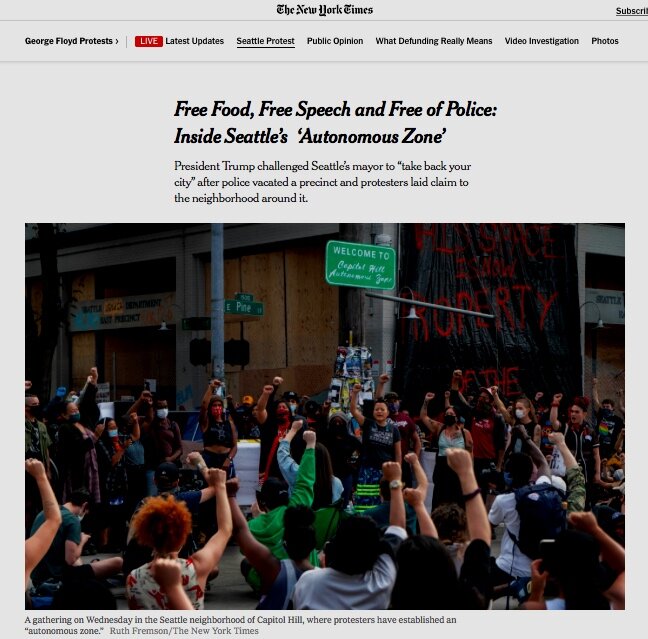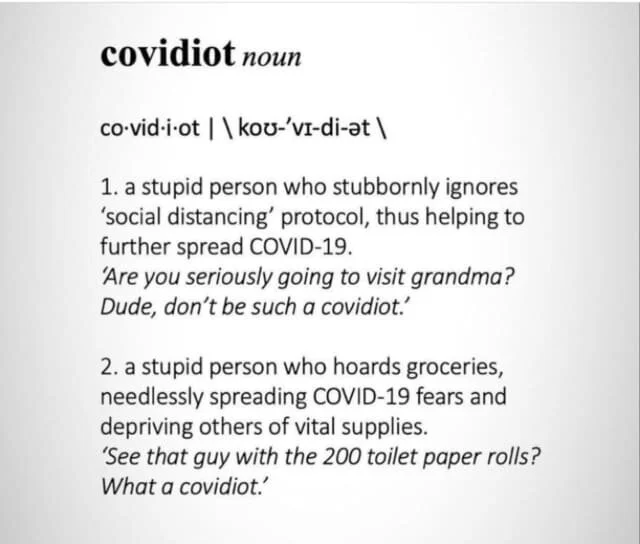We like to get upset with people for being bad citizens. Liberals point the finger at “covidiots”—the shelter-in-place “resistance fighters” and ardent churchgoers who prioritize their personal fulfillment over the health of their communities. In recent days, conservatives have tended to condemn the looting teenagers who clear the shelves of stores under the cover of anti-police brutality protests. The point is not to claim that there is some moral equivalence between the groups, but to try to locate a parallel in the flawed lenses through which these figures are interpreted. In both cases, the group in question is blamed for failing to be upstanding citizens. These are just the latest round of outrage over the misbehavior of fellow denizens. The condemnation of bad, “selfish” citizens is nothing new. Over the past decade, social media has been awash with all manner of selfishness-bashing. Implicit in the reactions is the demand: “why can’t you behave yourself, and play by the rules?!” What these condemnations miss is the extent to which the social contract that is meant to bind us in solidarity with one another has been deteriorated by decades of awful policy, failure to solve persistent problems, and the state’s abnegation of its duties to its citizens. In a society where corruption, exploitation and inequality are rife, and where selfishness is handsomely rewarded, bad citizens are precisely what you’d expect.
This isn’t the same thing as the (very good and equally valid) argument that was put so well by Booker T. Washington in 1902 when he stated that “A man cannot have moral character unless he has something to wear, and something to eat three hundred and sixty-five days in a year. . . . You will find at the bottom of much crime the fact that the criminals have not had the common necessities of life supplied them. Men must have the comforts and conveniences—certainly the necessities of life—supplied them before they can be morally or religiously what they ought to be.” {Booker T. Washington, Character Building (1902), 130-31.} That argument, while true in many cases, doesn’t really explain covidiots and looting. What we have now is not what Booker Washington would have seen as “ungentlemanly behavior“ stemming from a lack of material necessity—an argument that is perhaps too tempting to anyone of a politically left persuasion. What we have is a failure of governance, where the social contract has dissolved, and in which selfishness actually is in one’s best interest, because there is no shared set of norms that serves everyone’s interests.
The political theorist Wendy Brown gives us an explanation for this in her book Undoing the Demos, in which she conveys that neoliberalism (the valuing of economic, rather than social good—an ethic that has been the primary driver of governmental policy over the past few decades) has dramatically eroded the meaning of citizenship. Politics have been remade according to purely economic rationality, and under these conditions, “the foundation vanishes for citizenship concerned with public things and the common good.” What we’re left with, Brown insists, is a notion of citizenship in which we have largely lost all “engagement with public interest.”
Today, we expect state ineptitude. Governments have clearly signaled that they are unable to address the coronavirus crisis adequately (though they’re not above taking credit for any progress or positive developments!). The Trump Administration’s actions here have been exemplary. The federal government has denied any responsibility to assist states in combatting the virus or providing medical equipment or PPE, yet issues frequent statements hailing its own success in handling the crisis. The ultimate message is clear: “don’t count on us to furnish a solution.” With that being established, we look for solutions elsewhere, and at the moment, the only viable option for mitigating the crisis seems to be the universal social responsibility of everyday citizens. As Wendy Brown explains, under neoliberalism, the state continues to demand “citizen sacrifice.” “[I]n the transition from liberal to neoliberal democracy,” Brown elaborates, “citizen virtue is reworked as responsibilized entrepreneurialism and self-investment.” Instead of citizens debating common or collective good, and implementing of the agreed-upon vision as state policy, we end up with individuals having to haphazardly and create and implement their own protections.
Here, the state steps in to demand sacrifice, but never to offer solutions. Under neoliberalism, Brown explains, the “citizen releases state, law, and economy from responsibility for and responsiveness to its own condition and predicaments,” yet, unbelievably, is expected to be “ready when called to sacrifice to the cause of economic growth, competitive positioning and fiscal restraints.” The citizen, therefore, increasingly has no rights; only duties. Brown calls this “responsibilization”: the citizen is “responsibilized” through demands to share the burdens of sacrifice, such as “the effects of curtailed state investment in education, infrastructure, public transportation, public parks, or public services,” or other forms of political and economic hardship. As Benjamin Studebaker has cogently argued, when it became clear that our governments were not going to save us from the coronavirus, “we stopped making political demands. . . [and] started looking at each other.” Especially as the economy was forced back open, it became “our responsibility to stop the virus. You are supposed to social distance. You are supposed to wear a mask.” The same logic is at work with the way we are expected to respond to the recent riots, where “the discussion moves further from a critique of the state’s policies and institution, toward a superficial cultural discussion about whether we have the right feelings about the riots as individuals. We are now already more interested in our own reaction to the riots than we are to the state’s reaction,“ or, indeed, to the injustices that gave rise to the riots.
And the results are what you might expect: while many people quietly accept this responsibility, many others do not. For some, this looks like participating in a Black Friday stampede or demanding that Arby’s reopen in the middle of a pandemic; for others, it looks like looting a Foot Locker. For still others, it looks like burning cars in a riot. Again, this is not to draw an equivalence between this activities, which are animated by differing visions of collective responsibility and social solidarity. The point is that, in the absence of rights, you can expect the rejection of the responsibilities of citizenship.
The radical theory collective Tiqqun has described contemporary conditions as being governed by a “politics of sacrifice,” where we are all called upon to "‘tighten our belts,’ and more generally, . . . to behave ‘in a responsible way’ in everything we do.” Tiqqun rejects this manipulation, parrying: “But responsible for what, really? for our shitty society? for the contradictions that undermine your mode of production? for the cracks in your totality? Tell me!” As they point out, the best-case scenario of everyone being good citizens is woefully inadequate as a political vision. To be a good citizen is to surrender ourselves to the plan of managerial ineptitude decorated with little feel-good gestures. “Rather than fight against the social relations ravaging the most basic conditions of existence, the citizen sorts out his garbage and fills his car with alternative fuel. Rather than contributing to the construction of another reality, on Fridays after work he goes to serve meals to the homeless in a center run by slimy religious conservatives. And that is what he is going to talk about at dinner the next day. The most simple-minded voluntarism and the most gnawing guilty conscience: these are the citizen’s defining characteristics.” The authors confront this paltry vision with refusal: "We aren't citizens. We will never adopt your point of view of the whole, your management point of view. We refuse to play the game, that is it. It is not our job to tell you which sauce to cook us with.”
Tiqqun’s is a left critique of neoliberal citizenship that demands better collectivities in which the social contract is legitimate; they are not merely hyper-individualists who reject the social contract altogether. Their point is that, in a highly stratified and extractive society, where many lack any clearcut material benefits from being a member of our society, the deal isn’t worth it. Citizenship becomes an extractive, exploitative prospect, rather than a mutually-beneficial contract freely chosen. Here, they offer some insight into why many, many others might refuse to be good citizens: in their eyes, the social contract is broken, and we do not have a society worth caring about. Those who still care—usually those privileged people who still have a lot to gain from the maintenance of the existing order—seek to use shaming to incentivize people to behave as good citizens. Rather than tackling the corruption of the state and society, they dig their heels into the neoliberal expectation of responsibilization, now mixed with moralism, and demand that people be good citizens without offering them a compelling reason to do so.
What we need in the short-term are collectives and para-institutions that begin to fill in where state is failing. These must offer real social solidarity and security—and not at the cost of exclusion and exploitation. We need collectives that offer a better deal than existing political structures. In addition to looking after people’s material and social needs, these institutions ought to serve as fora for political imagination. Wendy Brown calls these the “Venues” and the “Valences” of political life: the infrastructures that cultivate new commons, public spheres, etc.
Long-term, we need movements—perhaps cultivated in these new collectives and para-institutions—that challenge the state, and compete for state power, so that we can build a society that is worth caring about. Until then, we will never see “good citizens” flourish. Demanding good citizens without good governance is putting the cart before the horse.


















